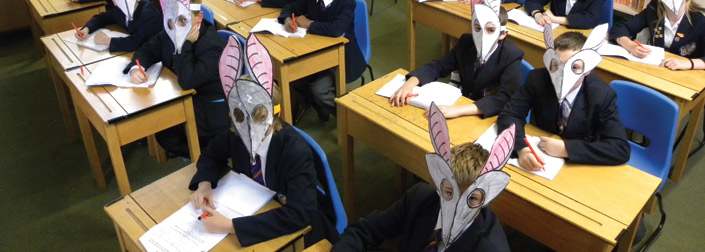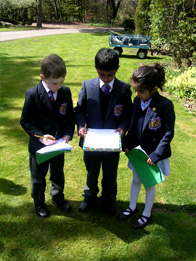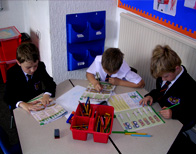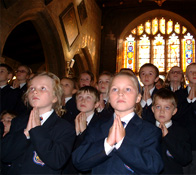Junior
The Junior Curriculum has been designed to provide a broad and balanced, knowledge-rich and skills based primary curriculum. Its content is delivered through a range of subject-specific projects, which last either a full term or half term. Overarching topic themes are History or Geography focused. Alongside these topics, accompany companion projects in Science, Art, Art and Design, Computer Science, PSHE and RE. We continue the norm that subject-specialist teachers teach PE, Music, Drama and French so that they can continue to build on each child’s knowledge and skills learnt in prerequisite years. Children in the Junior Department are encouraged to create their own ‘opportunities’ in areas of the curriculum that they feel innately good at or interested in. They can do this through joining after school clubs. It is our obligation to nurture whatever talent a child possesses and we aim to assist in the development of, and actively promote, good social and behavioural skills, sensitivity and strong initiative - essential characteristics in every well-adjusted individual.
Teachers in the Junior Department encourage children to develop their own independence through having ‘excellence’ of themselves and each other. In addition to this, teachers continue to offer a nurturing environment to provide equity for all. Pupils hold each other accountable for their personal and social development through following the school's strict code of conduct: Excellence, Compassion, Determination, Opportunity & Service. Our school’s values are thread throughout all that we do to ensure our children become equipped for the 21st century developing responsible, respectful and active citizens.
Our curriculum comes from Cornerstones Curriculum Maestro, which puts spiritual, moral, social and cultural education at the heart of its curriculum. It has been designed with three structural tiers. Each tier builds on the previous to create interconnected layers.These interconnected layers provide a robust framework that ensures connectivity across the curriculum with direct links back to the National Curriculum programmes of study.
Tier one comprises ‘Big ideas’ -global aims.
Tier two are the overarching ‘concepts’ and ‘aspects.’ A ‘concept’ is an abstract idea within a subject and an ‘aspect’ is a particular part or feature of a subject.
Tier three, is the programme of study. Concepts and aspects are broken down into smaller component parts or ‘chunks’ to form a cohesive progression framework. The progression framework runs as a ‘mixed-age group’ from Nursery to Year 6 and includes knowledge and skills that children need to know and be able to do in order to make progress.
English
In the Junior Department, English is broken into four dimensions: Vocabulary, Grammar and Punctuation; Composition, Word Recognition and Reading Comprehension. We have a firm belief that all children have the ability to read and write proficiently regardless of their economic background or educational needs. For that reason, we have carefully designed our English curriculum so that all children have the opportunity to thrive in literacy providing a breadth of exposure to different literary texts that link to their current topics.
Reading: children master their skills to retrieve and record, interpret information, synthesis and summarise what they have read. They develop their prosody of reading through fluency and choral practise. Children are exposed to a variety of genres based on their current Topics to allow them to make connections and inferences in their other subjects.
VCPS: children explore etymology and morphology of new words they come across. They develop a skills based toolkit of age appropriate grammatical structures and use of punctuation whilst revisiting ones from previous years.
English Composition: children learn the process of writing through a skills based approach. They are taught through explicit modelling of ‘writers' thought’. Children demonstrate their understanding of the English language, genre of writing and evolving literary flair by planning, drafting, revising and editing their work before publishing it.
Maths
Mathematics is an integral part of the curriculum in the Junior Department. There is a great emphasis on teachers identifying misconceptions and regularly responding to children so that we can quickly close gaps in the chronology of their mathematical knowledge. With this, we have chosen to use the scheme White Rose Maths so that the knowledge and skills have been systematically mapped across school from Nursery through to Year 6. Children are given regular opportunities to apply mathematical facts, concepts, methods and strategies that they have learnt. We do this by using a Maths Mastery approach that places emphasis on conceptual understanding before procedural knowledge. Our aim is for children to become proficient mathematicians so that they can deepen their confidence in the subject through reasoning and problem solving building on the school value of determination and opportunity.
There are two progression cycles to the WIS Primary Curriculum. The overarching projects are:
Lower Key Stage 2:
-
Cycle A: Through the Ages -History, Rocks Relics and Rumbles -Geography and Emperors and Empires -History
-
Cycle B: Invasion -History, Misty Mountain Winding River -Geography and Ancient Civilisation -History
Upper Key Stage 2:
-
Cycle A: Dynamic Dynasties -History, Sow Grow and Farm -Geography and Ground Breaking Greeks -History
Cycle B: Maafa -History, Frozen Kingdoms -Geography and Britain at War -History
|
Science
SEND Pupils
|
||
|
Acquisition of knowledge and skills
Learning environment and resources
|
||
|
|
||
|
|
||
|
|
||




